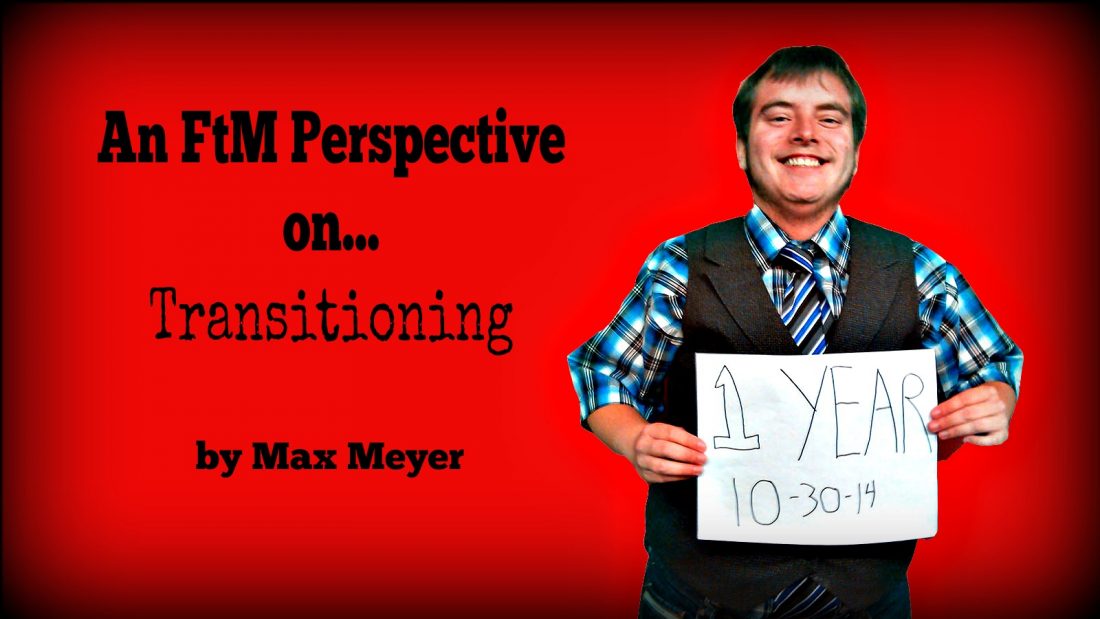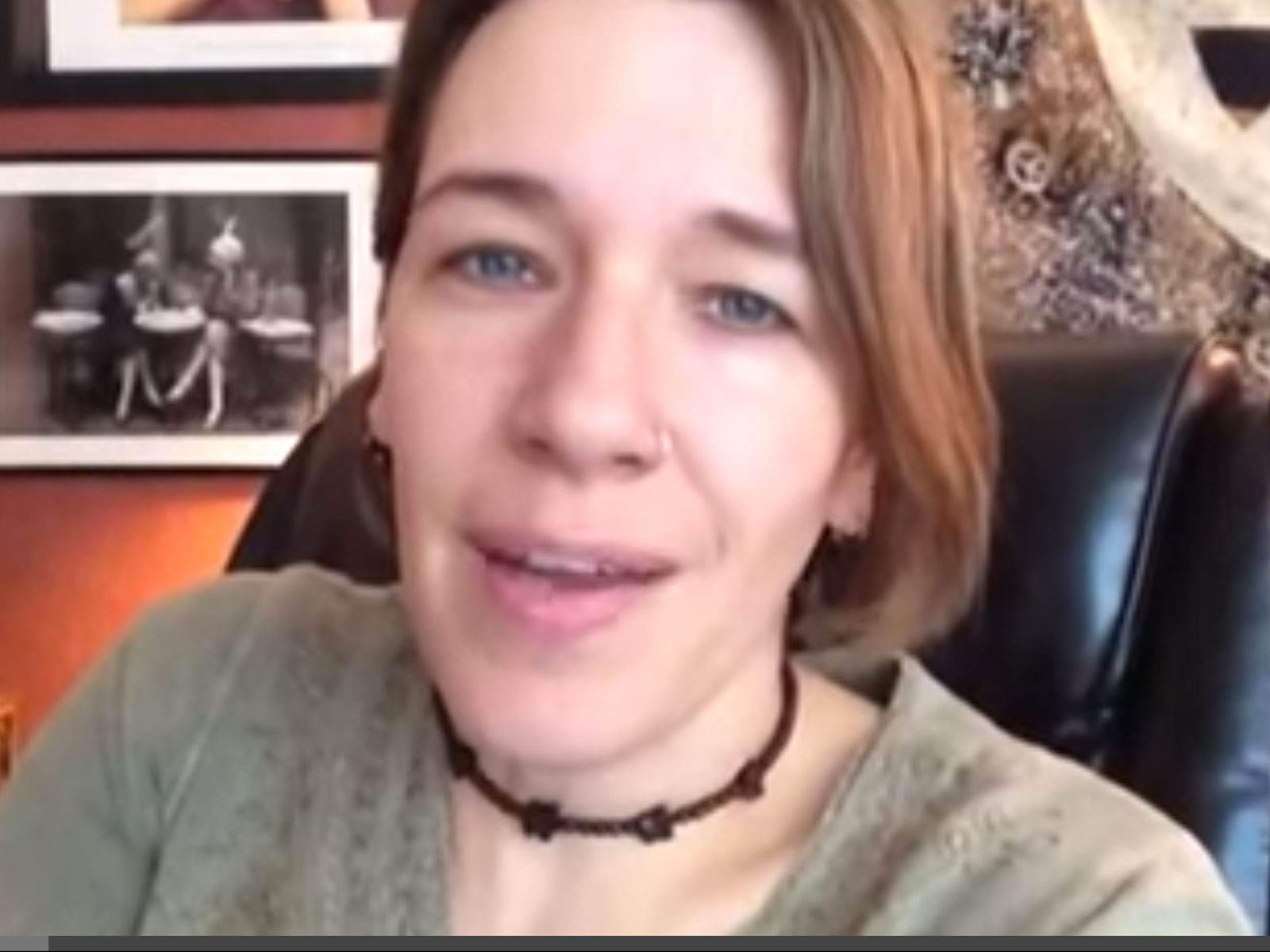
An FtM Perspective on…Transitioning
by Max Meyer
The Most Important Lesson from My Transition
There is a misconception that transitioning will fix all of the problems in your life. Although it does offer a great sense of fulfillment through the joyful acceptance and expression of a huge part of your identity, there are still other parts of your being to explore.
There is a void in every person, a sense of inadequacy, a doubt in the purpose of your existence. People have found a variety of ways to fill this void: alcohol or drugs; food, technology, career, or exercise; religion or spirituality; many lovers or a single person that defines their existence. Even though transition quiets the persistent voice saying something is wrong with your body, transition cannot fill that void either.
In the beginning of transition, I was ecstatic. Everything was so new and exciting. I experienced the greatest relief to finally reveal my real self. There were so many little bursts of happiness to enjoy: the acceptance of old friends, hearing my new name, and seeing my new name in print. I took immense pride in every accomplishment along the journey. The transition happened quickly and relatively smoothly. I could not be more excited about my new life.
I struggled with the concept of divorcing from my past, personified in the old me. The idea of having a new life completely separate from the traumas of my childhood appealed to me: a new name, a new gender, a new chance in life. Transition can easily give life a new meaning and purpose.
Dread of the impending end of this happiness plagued me. I feared I would suddenly fall into the same old pit of despair.
Instead, I slowly became aware of the old emptiness. The feeling of lacking something important still existed in my new life. This is not to say I regret my transition. I have a deep love for my body since transition. I am much more comfortable with myself and more confident. I would never go back to the person I was.
When I completed my transition, I experienced the satisfied deflation that I feel every time I finish writing a book, end a relationship, explore my inner feelings, or accomplish a long-term goal. Transition is another project into which I have put a piece of myself. I invested a huge amount of time and emotion into discovering and expressing my gender identity. It is an experience that will affect many aspects of my life for the rest of my days.
I began to wonder, “What is the meaning of life past transition? What else can give me little bursts of happiness and pride? Will I ever be complete? Is the whole purpose of life to do well in school so I can get a good job so I can afford to put my own children through school?”
This cycle seems pointless to me. I want something more.
People have a misconception that since I transitioned at a young age, I have answered all of life’s questions. Yes, I have deconstructed society’s notions of gender norms; explored the core of my identity; found the words to express myself; educated many people; waged war against entire bureaucracies of medical corporations, school districts, and even the United States government.
But that does not mean I know what to do with my life. There is not much writing about what happens after transition.
Transition can consume your life.
There will be hours spent exploring with psychiatrists, negotiating with doctors, and standing in line at courthouses and government agencies.
There will be long, difficult conversations with family members, friends, employers, and teachers.
You will feel certain that if you must defend your pronouns one more time to another ignorant person, you might explode.
There will be times when you feel like you are drowning in the paperwork, not to mention hours of endless loops of aggravating hold music on the telephone. Soft classical music will slowly drive you insane.
There will be days when you must wage a battle against your self to leave the safety of your own home or to enter a public restroom.
You will experience the brightest joys and darkest despairs. The emotions will enlighten your soul. All of these processes will devour so much of your time, expenses, mental power, and patience that your transition will become a second job.
But transition is not an identity. Once everything on your checklist is completed, what will you do with your life? What will your next adventure be?
At some point, you will be faced with the same questions that everyone must answer: what do I want to be when I grow up? Where do I want to live? What do I like to do for fun? With whom do I want to spend my life?
If the process of transition has consumed your identity, you will not be able to answer these questions.
This is why it is important to maintain a life outside of transition. Hobbies and social groups are crucial. Other goals, aspirations, and passions are critical. There is a lot to be passionate about when it comes to your gender, but life offers many additional passions.
Although the process of transition may take years, you will eventually complete it. At which point, you need to be able to say, “I am enough. This life will be enough.”
Only then, will you be able to fill that void permanently.
The Taped and Tattered Man
by Max Meyer
I am a self made man
pieced together with
broken social constructs
at 1:45 in the morning
by my mother’s tears.
I have a papier-mâché heart
torn and pasted,
sticking to fingers and hair,
everything except the paper
leaving a residue in the cup
of edible glue
waiting to be devoured.
All that is left in tact
is my mind
humbled by the vastness
of the universe,
yet haughty by my own
ingenuity from mastering
my identity and from
unlocking the secrets
of my galaxy
and unleashing
the beast
behind my mask,
tribal and uninhibited,
now hunted by my
former self.
My lips are sealed
to protect the future
from my past.
I am in every part
a man as real as
the one who contributed
to your life,
as complex and true
in the Frankensteinian collage
that I have constructed
under watchful eye
from stardust painted
onto tiny papers.
I recreated my fluttering
existence.
Author Bio
 Max Meyer is a 22 year old FtM college student. He interned for two years with the Mammoth Times during high school, interned with the UC Davis Department of Plant Pathology while studying forest pathogens, and worked with the American River College Disabled Student Services as he completed his transition. He recently moved to New Mexico to obtain a double major: a B.S. in Agricultural Extension Education and a B.S. in Agriculture and Community Development. He hopes to connect his passions for sustainability and diversity in the creation of communities that exhibit high respect for biodiversity and human diversity. Currently, he is trying to develop a supportive and progressive transgender community in New Mexico.
Max Meyer is a 22 year old FtM college student. He interned for two years with the Mammoth Times during high school, interned with the UC Davis Department of Plant Pathology while studying forest pathogens, and worked with the American River College Disabled Student Services as he completed his transition. He recently moved to New Mexico to obtain a double major: a B.S. in Agricultural Extension Education and a B.S. in Agriculture and Community Development. He hopes to connect his passions for sustainability and diversity in the creation of communities that exhibit high respect for biodiversity and human diversity. Currently, he is trying to develop a supportive and progressive transgender community in New Mexico.





Emma
February 26, 2015 at 11:13 AMAs one who is in the early stages of transition I can definitely see how it can become an all-consuming part of a person’s life, and have even wondered myself what my life will be like after transition. While I personally believe that transition never really ends because I believe our genders are constantly evolving as we progress through life, I still have to acknowledge that a point in time will come when the majority of the big changes will have been accomplished and I’ll be left with no more benchmarks to look forward to. When that day comes what will be left for me to do?
Now, I, myself, know what follows after my transition is “completed” because I know that as an intelligent being with unlimited potential that I will always be growing and becoming more, so to expect completion from external means would be silly, but I’ve found that many transgender individuals struggle with what you’ve mentioned above. They find themselves in this place wondering why their transition didn’t completely fulfill that void you described and begin to fall into old patterns of dysfunction. This is partially why it’s so important for transitioning individuals to seek psychological counseling to help them deal with their issues, especially the ones that are unrelated to their gender identity problems, so that they may come out the other side of transition as a more complete and functional person; but more than that, transitioning individuals (and all humans, really) must realize that the void you are referring to is impossible to fill, because it is based on a flawed premise that outside things can provide happiness, and transition is no exception.
No one’s transition will ever fill that void, because it’s an unfillable void. That void is the distance between identifying with our minds (egos) and embracing the present moment, and as long as we are concerned with gratifying our ego through external means (transition, career, romance, money, fame, etc.), we can never fully embrace the present moment, and will therefore always live with that void. That void disappears, however, when we cease to dwell on the past or project ourselves into the future and begin to live fully in the present moment. Do not get me wrong, Transition is an important process to go through because it’s a way to alleviate physically-driven suffering (much as one would fix a broken leg, or remove a painful tumor), but the true alleviation of the emotional suffering that you described only really comes when we forget the ego (dis-identify with the mind) and just exist in the here and now. When we can fully, consciously embrace and immerse ourselves into whatever it is that we are doing or experiencing, the ego/mind disappears and we become one with the infinite intelligence that creates all matter and animates all life. In that place there is no suffering, no void, no worry, no fear, no pain.
Unfortunately, transitioning can actually increase how much a person identifies with their mind/ego. They become so immersed in the transition process (constantly thinking about their past pains/struggle and worrying about what their future will look like) that they lose themselves to it, so when it finally comes to an end, they are left with the same suffering they had before. Sure, their bodies and social identity finally feel right to them, but their minds are still lost in an endless sea of dualistic thinking (past/future, happiness/sorrow, pleasure/pain). If they could only learn to let go of that dualistic identification with their minds/egos, and start embracing life in the ever-present (it’s always now, have you ever noticed that? It’s never tomorrow or yesterday, it’s always now; always the timeless now, except for when you are thinking about the past and future, at which point the now ceases and you become lost in time again) they would find that void is but a figment of their own creation. None of us are devoid of anything, except when we identify with our minds and mistake the tool of thought as our actual selves.
I say there is no need to worry about the illusionary void after transition if one can learn to erase it permanently by embracing the present moment fully.
Okay, I’ll put my soapbox away. I really enjoyed what you wrote and think you have, more or less, figured out what I wrote here already. For the sake of those who haven’t, however, I hope my words were beneficial.
Ashley
March 19, 2015 at 10:32 PMWhat makes it more frustrating, is that I understood this 5 years ago and still could not stop
it from happening.
I could not find that peace. I knew the ‘transitional high’ would wear off. It only gets worse
if you are still battling federal and commercial medical ‘experts’ about why you need your
HRT. It keeps the peace when your ‘core self’ is in harmony; but it won’t solve your life.
Just like what you see in ‘Revenge Movies’. The characters that lived a whole life of getting
back at someone, don’t know what to do after the confilict is resolved.
Thank you for your thoughts!
You expressed what I have also been feeling and its a pleasure getting your account.
Ashley
March 19, 2015 at 10:36 PMrats!
I want to edit that so bad, My paragraphs did not look
like that!
Cai
July 31, 2015 at 10:39 AMWhen I first came out as bi, people didn’t like that it consumed my life. Now as someone trans, my friends do get it. Trying out new things because I was afraid being “butch” would get in the way. Seeing philosophies and concepts from different points of view my lot in life previously didn’t allow me to.
But I have in place a life after transitioning. Finish college. (I’m putting it off one more year to focus on the transitional aspects of my transition; when I went through the legal aspects, that distracted me from studies often, and I don’t want to risk that again.) Work on going through the ranks at Starbucks and run my own store, eventually run one of the new roasteries we now have. Travel to Tel Aviv and Jerusalem with my friends so they can see where their faith and ancestors hail from. Take care of my parents, take care of my aging friends, take care of older foster children who are soon to getting kicked out of the system. Work to help get animals out of shelters and into good homes. Volunteer for good causes.